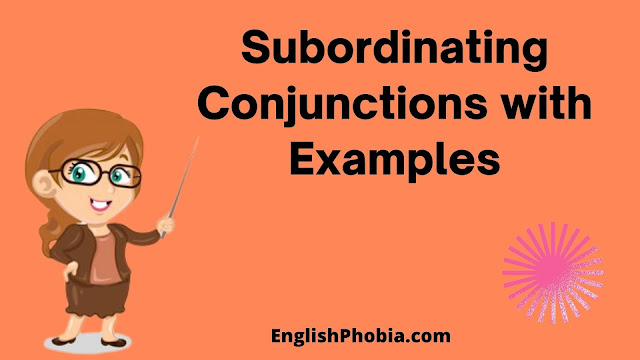Conjunction is word that is used to
connect two or more than two words or parts of sentences.
There are two types of conjunction in
the English language
1. Coordinating
Conjunctions
2. Subordinating
Conjunctions
In the previous parts you can have an
easy glance at our first types of conjunctions wherein you
can learn the basic definition of conjunctions and its all the types all
together.
In this part of conjunctions we are
going to learn the rest part of conjunction with examples and types
Subordinating conjunctions are very
important in terms of competitive exams. Let’s start the article without
further delay.
Conjunctions of
reason
This type mainly focuses on the
cause or reasons for something. The below conjunctions are used for it.
(Since, for, therefore, That, As,
Because, Now that)
1. Since I was absent,
nobody came to attend class.
2. Since it was raining,
he carried an umbrella with him.
3. Since she didn’t hide
anything from me, I cleared everything about my life.
For
1. People work from
morning to evening for they can provide a peaceful life to their family.
2. Narendra Modi inaugurated an electricity plant for
we can use electric vehicles largely.
3. The time to examine oneself is exams for the
students burn midnight oil.
Therefore
1. Learning English is
my passion therefore I keep improving myself every day.
2. She was ill therefore
I prepared breakfast for her in the morning.
3. We had an arranged
marriage therefore she doesn’t know much about me.
As
1. As she is my soulmate, I am always ready to move
mountains for her.
2. As the new variant of coronavirus has arrived, the
virologists are working for remedy.
3. Everybody can’t know you as you are not the prime
minister of this country.
Because
1. I do what I like
because I listen to my inner voice and follow my heart.
2. We shouldn’t smoke
because it is injurious to health.
3. I love teaching
because it teaches me unknown ways to live my life differently.
Now that
1. Now that she couldn’t pass the exam, she would
prepare for it better next time.
2. Now that most students are unemployed, they are
engaged in illegal activities in order to carry out their household expense.
3. Now that the schools are once again closed owing to
extremely polluted air, the students will lose their interest in studies.
That
1. I am blessed with a
boon that I am such an amazing friend like you.
2. She was lucky that
the H.R. selected her for the post of a writer.
3. People was anxious that one more variant of Covid family has come for devastation in the world.
Conjunction of time
(when, as soon as, whenever, as, ago, as soon as, while, after before, until or till, by the time, as long as, ever since)
When
1. When I left home, it
started raining.
2. A true friend is with
you when you need him the most.
As soon as
1. As soon as the
teacher entered the class, everybody stood up.
2. I started teaching students grammar
lessons as soon as I finished my course.
While
1. While we sleep at our
home, the soldiers do their duty at night.
2. The lockdown took
place while he was out of India.
Before
1. They could not
compete the project before the time.
2. The patient died
before the doctor arrived at the hospital.
After
1. We went to Dehradun
after the examination had finished successfully.
2. After some days, I
will apply for the content writing job in another company.
As
1. As we passed school,
we went for a summer vacation in Goa.
2. The
Until or till
1. We didn’t proceed for
the next step till each of our team mates was with us.
2. Till the bodyguard
allowed us to enter the premises, we had to wait outside.
Conjunction of purpose
So that, lest, in order that
So that
1. We must tell
the doctor about our problem shamelessly so that he can treat us better.
2. The parents should have a friendly behavior with
their children so that they can share with them everything.
3. I read books a lot so
that I can improve my reading habit.
Lest
1. Always try to
perform your best lest you should repent at the end for it.
2. She didn’t let me
know about her departure lest I should have followed her.
3. Hurry up, lest you
should miss the train.
In order that
1. People work and earn
money in order that they can feed their families.
2. He joined the telegram group in order that he
would learn English grammar step by step.
3. The army personnel were deployed in Jammu &
Kashmir in order that they could protect the public.
I hope that you could easily understand
it with the help of many examples given for each type. In case you have any
doubt regarding it, kindly let us know in the comment box.







2 Comments
useful information
ReplyDeleteReally super amazing information. Thanks
ReplyDelete